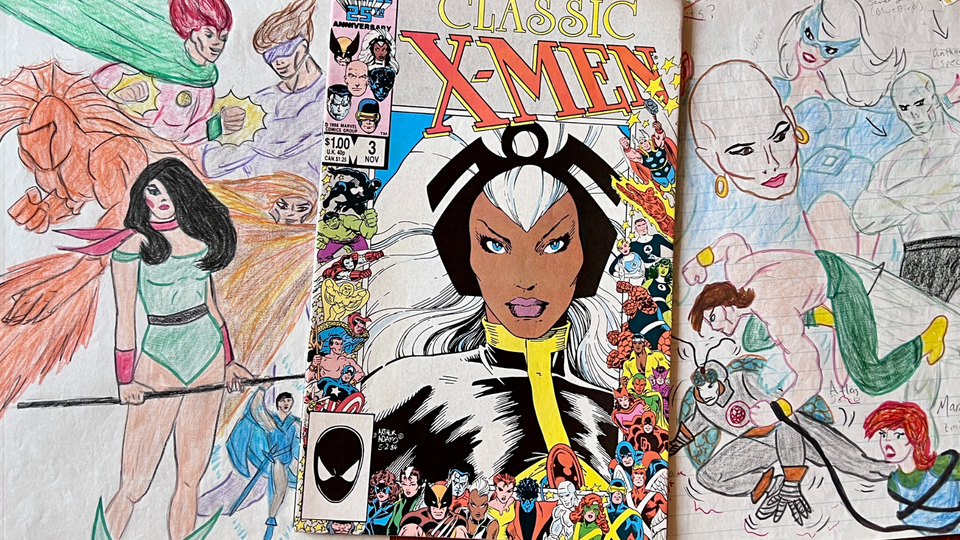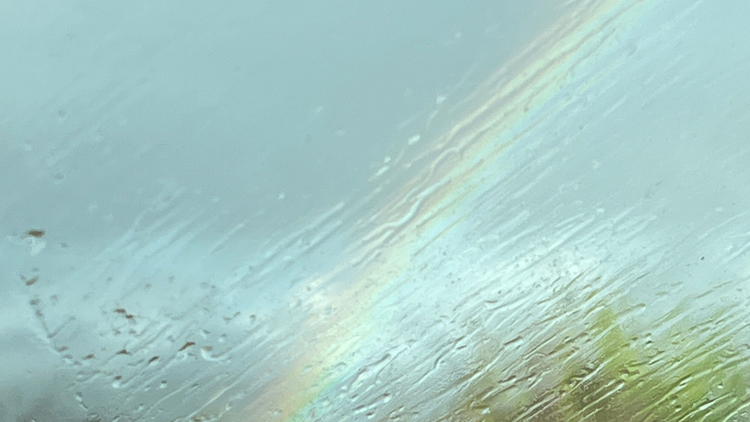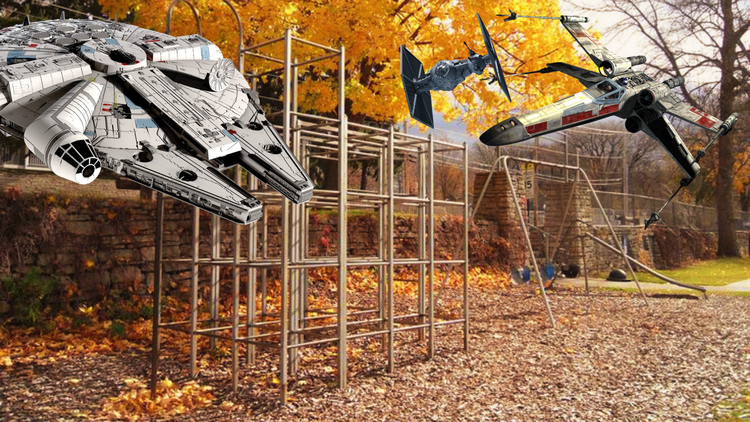Goddess

Check out this video to see the drawings thirteen-year-old me was making during this story and the comics that inspired them!
Author's Note
I’ve told this story in different ways many times over the years, but this is the definitive version of a grocery store encounter that changed my life forever.
Goddess
It’s 1986. I’m 13. My family is living on the outskirts of Houston, Texas. It's a time of economic uncertainty for the United States, and it’s striking how many of the political tensions I touch upon in this story are happening again right now, especially with our current aggression with Iran. This was all background noise to me back then. I was just beginning to wake up to my own adolescent turmoil, and it’s an understatement to say my home life was fraught.
I regularly escaped into my imagination, creating characters and otherworldly stories just to get through the day. Back then, I didn’t realize the superheroes I fell in love with would later become million-dollar franchises—controlled by companies that never want the narrative to conclude, because then the money stops. I had no clue about the machinery behind the scenes. I was starting to recognize different writers and artists, learning from them, finding the courage to tell my own stories.
These stories provided my traumatized younger self with heroes to believe in, to emulate. They represented a higher standard—inspiring me with their humanity, their conviction. The X-Men, especially, represented the *other*. Their powers emerged in adolescence, forcing them to grapple with teenage angst alongside newfound abilities that could be destructive.
Today, Marvel is owned by Disney. For years before the buyout, Marvel sidelined the X-Men in their shared universe of comic book stories because Fox owned the film rights, and Marvel wanted them back. As a result, the stories suffered. And now, in this era of heightened transphobia and bigotry, I think about how the powers that be are trying to control the narrative around trans and queer people. It makes me want to reach out to my fellow mutants, my fellow superheroes—the ones whose very existence defies the system trying to oppress us.
There are so many people fighting to lift up and protect trans folks, even as the state passes more laws against us. The parallel is impossible to ignore: the X-Men fighting for a world that fears and hates them. Trans people embodying living alchemy– our true superpower--in a world that wishes to erase us.
I still read some comics today, but I’ll admit—a lot of the joy is gone. I know that when I let corporate-sponsored stories live in my consciousness, I squeeze out the ones that are truly mine. The original ones. The ones not shaped by shareholders or bottom lines.
Just like the heroes of my childhood, I know the narrative is in my hands now. I know my power. I know my worth. And the journey I’m on now? It began here.
Thank you for reading "Goddess." I hope you enjoy this story.
~SA
Goddess
by Storm Arcana
Mother sits slumped in the recliner, an angry ancient deity, frowning and sweating, wearing a white tee shirt and khaki shorts. Her eyes are red and glassy, glued to the television blaring condensed stories about the U.S. bombing in Libya, a nuclear accident in Chernobyl, and hostages in Iran. Last week she’d given herself a perm and it hadn’t turned out well. Bobby pins fight to hold her hair in place while several frizzy tendrils stick to her skin. She holds a wad of paper in one hand and a plastic pill bottle in the other. She shakes it at me and a couple of pills rattle around. She hands me the paper.
“Here’s the list of grocery items I want and the money you’ll need for what’s on it. Be quick about it.”
I take the list and the ten dollar bill and walk outside.
The sun is high in the sky, beaming directly down on me with no clouds to block out its warmth. I squint and let my eyes adjust. I’d been sitting at my drawing board, brainstorming comic book characters to draw when she called me. My mind is still a tornado of ideas, new powers, costumes, secret identities. I walk across our backyard, dry and lifeless, exit between two broken boards in the fence. Our house is on a street with several homes that look just like it; two story structures with built in garages, brick chimneys, tiled roofs. The last family that lived in our house had an elevator installed for their elderly mother but my parents forbid us to use it. That family and most of the others in this neighborhood are gone now. My folks are paying really cheap rent so our house doesn’t get broken into like the others. Every now and then the cops come through and chase out squatters.
“It’s the oil crisis, son,” says Dad, “Houston’s going through a tough patch, but Reagan’s gonna to fix it.”
How will Reagan help our neighborhood reclaim its soul? And if he did, would we still be here? The only family left on our block is the Neyrams from Iran, and Mrs. Neyram hates it here. She stays in her living room watching soap operas, leaving the house only to walk the driveway’s distance to the mailbox. Mr. Neyram is home late in the evenings and on weekends. On Saturdays he grills steaks. My father’s home even less and when he is, we all suffer for it.
I trudge along the abandoned black tar parking lot between our house and the grocery store. Its surface is lumpy and disheveled, littered with plastic bottles and broken glass, clumps of grass struggle to grow tall in between the cracks, wilting in the sun for their ambition. I can feel the heat soaking up into my tennis shoes. I kick an empty plastic jug and send it spinning into some cans. The earth is trapped beneath all this black pavement, and I can feel her anger, smothered and mute, sending minute fissures through the blacktop.
When did the beatings start? I try to remember exactly when it became routine to expect him home, drunk and surly, looking for any excuse to “discipline” me. Spankings became beatings, instead of using his hands, he’d take off his belt and whip me. Anything could set him off, a negative conduct mark on my report card, a chore left undone, a perceived “attitude” problem. The next day he’d avoid us, whistle a tune while he got ready for work, as if nothing had happened. When had he changed from the man at the front of the church, respected and admired by everyone we knew, to the tyrant of our home with no friends to speak of? Before, my father seemed sad to me, stuck between the expectations of his mother and mine, and the reality of what his life had become. Mom told me he lost the churches because “he couldn’t keep it in his pants,” and I think I understand what that means, but when did that happen? When did he start drinking? When did the alcohol take over his life and ours?
The sliding doors open, cold air rushes at me and I pause, trapped between the disparate temperatures, goosebumps break out along my arms, the sweaty spot on my chest where the fabric clings to me becomes unglued. I smell hot yeast rolls rising in the bakery and the sharp chemical odor of plastic bags and disinfectant. I thrust my hand into the pocket of my shorts and my fingers touch the ten dollar bill and the shopping list. The fluorescent lights lining the ceiling glare down on me, and black and white spots block my vision as I walk past the magazines. I bump into a spinner rack, stocked full of comic books. I reach out to steady the rack, my vision returning. As the little spots fade, a cover catches my eye: a portrait of a woman with brown skin, blue eyes, and billowing mane of white hair, contained by a black tiara, stares right at me, her expression serene and wise. There is a frame around her, composed of tiny superheroes all bursting out at the reader with their power and strength, but for all their flair, they do not detract from her beauty. I feel something deep inside me stir, an emotion long denied, and I feel calm and hopeful. I open the comic and flip through the pages.
The woman is a member of a team of superheroes and she has the ability to control the weather. She’s the only woman on the team and yet she seems the most powerful. She’s also independent and smart. I think I’m in love. I have to have this comic book. I look at the cover again, it’s a dollar. I’m pretty sure that Mother gave me exactly what I needed for the items she wanted and for nothing else, but I place the comic in a carry basket and run around the store with the list in hand, tallying the total in my mind. I go to the cooler section, stare at the last item on the list, a carton of milk, and notice it’s also a dollar. I know what I have to do.
“Here’s the groceries,” I say, “I have to use the bathroom!”
I run to my room first and pull the comic book out from under my shirt. I’d hidden it right before coming in, holding it in place beneath the waistband of my shorts. I lift up my mattress and slid the comic book under it. I couldn’t steal it. Didn’t feel that clever, especially after getting caught stealing before. But buying the comic instead of the milk and then lying about it felt okay. I didn’t feel bad about it at all. I flush the toilet and head back to the kitchen.
“Where’s the milk?” says Mother. She’s emptied the groceries on the counter and is looking in the plastic bag as if the cartoon might spontaneously appear. She’s been in the air conditioning all day, but she radiates the glare of the sun, the heat of the asphalt running off her.
“I dropped it.”
“How could you be so clumsy? Sometimes I swear--”
I don’t hear the rest, her voice is far away and I’m thinking about the woman with the lightning bolts and the thigh high boots.
“Luke, are you listening to me?”
She knows I’m not. This isn’t a lie I need to promote. I look blankly back at her.
“That’s it. Go to your room. I don’t want to see your face the rest of the day!”
I stare at my mother, unsure I’m hearing exactly what I want to hear.
“You heard me. Now go!”
I focus on keeping my eyes large and blank, desperate to not reveal the surge of happiness running through me. Then I run out of the kitchen. In my excitement, when I get to my room, I slam the door behind me. My mother stomps to the door and flings it open.
“What are you doing? You know you’re not allowed to close any doors in this house.”
I stand there sheepish, my happiness on pause.
“Sorry.”
“Your father’s going to hear about this,” she says, and leaves.
I wait until she’s back in the kitchen, blasting Chubby Checker’s “The Twist,” and then I carefully close the door, leaving an inch open. I grab a science textbook and place the comic in the middle in case she comes back. Then I dive into my new story.
The elemental woman is named Storm and she and her friends are breaking into a military complex to shut down some missiles from destroying the world. They fight an evil count who has half men and half animal underlings supporting him. The stakes are high and I’m turning the pages to see when Storm will use her wind and lightning again, but she’s not the focal point of the story, the spotlight shines on a Native American superhero named Thunderbird. There’s another story in the back of the comic drawn in a more realistic style and Storm is featured in a couple pages there. I memorize every detail of her speech, style of dress, and actions. I envy her confidence, power and prowess. I’ve found a new role model.
The last page reveals that the comic I’ve been reading is a reprint. The original story was published in 1975 and the story in the back is new material. On the cover, in the frame of heroes down at the bottom, Storm is there again, but she’s traded her mane in for a mohawk, her cape and ruby for a leather vest and choker. How did she change so drastically from the earth goddess I just read about to a punk rocker? I will learn all about you, I tell the blue-eyed woman on the cover, I will follow your story to the end.
I read the comic three times, and flush with inspiration, I sit down at my drawing board and I trace the cover image of Storm, keep the gigantic wind swept hair, but change the tiara and add diamond drop earrings. I trace more of the characters, put my own spin on them. I pull out a world atlas, assigning countries to heroes, and I scour the dictionary for cool code names and character concepts. I spend the rest of the day in my room creating my own superhero team.
My Dad comes to my room in the evening. I’m sitting on my bed, writing a script for my new characters.
“You doing homework?”
“Yeah,” I say, “Just studying my sign language.” It’s a lie, but based on truth as I do have to study sign language at school. I go to a magnet school for “gifted and talented youngsters,” and every day for an hour we have to interact with kids with hearing or other impairments. It’s supposed to keep us humble.
“After dinner, you and I are going to talk about what happened today,” he says.
“Okay,” I say, and follow him down the hall to dinner.
We all sit down at the table, Mother is across from me, Ruth is across from Dad, but Ruth and I might as well not even be there, while our parents discuss the decline of the neighborhood, and my father’s job as waiter at Ruth’s Chris Steakhouse.
“I’m going to take on a few more shifts next week,” says Dad.
“But you’re never here as it is,” says Mother.
“Rose, we need the money, you just said so yourself.”
“But the children--”
“That’s enough,” says Dad. He raises his hand and Mother backs her chair up. Ruth and I freeze in place. Dad looks over at me.
“Why didn’t you help your mother with dinner tonight?”
I look over at Mother.
“I told him to stay in his room today,” she says.
“Why is that?” Dad says, looking at me.
“Couldn’t count on him to get a few groceries,” says Mother, before I have a chance to speak. “Says he spilled the milk on the way back.”
“I asked him, Rose.”
“He’s not going to say anything. What’s to say?”
“Rose!” Dad’s face was getting red, his jaw clenched.
I thought about all the possible things I could try to say in my defense, so many lies run through my head. The comic book exchange for the milk seemed so far away after a day of drawing and writing. How had I framed it to Mother?
“Seems those retards at his school have rubbed off on him,” says Mother, “He acts just like them.”
I stare at my mother, my jaw dropped. I think about the kids in wheelchairs and helmets, some with very little motor function, and everything flashes red-hot. The words are out of my mouth exactly as I think them.
“You bitch!” I say.
Now it’s Mother’s turn to go slack-jawed. My sister covers her mouth with her hands. My Dad stands up, and his chair falls over. There’s a brief moment where I feel really good, a release of energy cascades over me. I’m even smiling.
“What did you call your mother? You think you’re funny?”
Dad grabs me by my shoulders and slams me into the wall. Something pops and I feel limp, all energy drains out of me. I see white dust from the wall float over my shoulder and white triangle shards crumble to the carpet. My mother and sister are apoplectic, their faces white as the sheetrock I’m embedded in. I think about a cartoon I saw where a bunny rabbit character ran into a wall and left a hole in it like the outline of their body. But I didn’t go all the way through, I think. You’d have to go all the way through. Then everything goes black.
I wake up in a hospital bed, my dreams about Egyptian and mutant goddesses still fresh in my mind. I’ve woven a narrative that combines Nephthys and Storm and it’s comforting. My body is numb and I’m glad, because I want to run and scream and cry and demand justice, but instead I’m going to float away until all of this changes. There’s a woman in white talking, she says I’m going to be fine; just a dislocated shoulder, and I think about telling her My father did this to me, take him away, but I can see him standing in the corner with his arms folded, a sentry in the shadows.
~SA





Member discussion